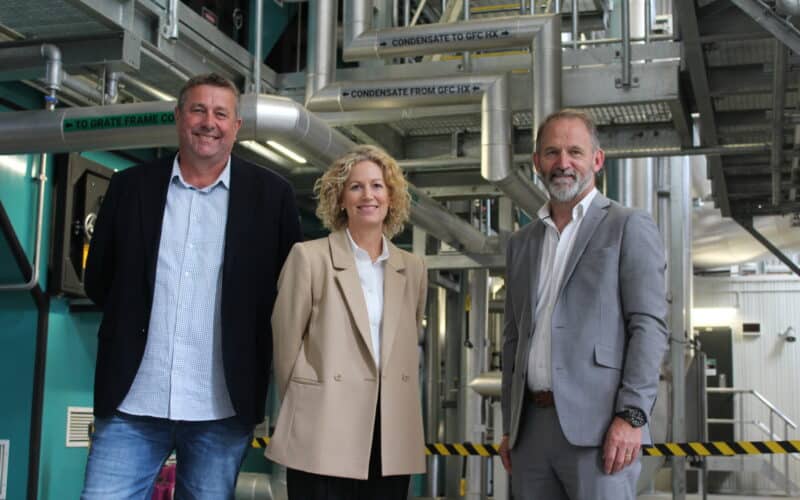South Otago’s Stirling cheese factory has become Fonterra’s first plant to run solely on renewable energy.


South Otago’s Stirling cheese factory has become Fonterra’s first plant to run solely on renewable energy.
Work on the $33 million replacement for the coal-fired boiler, dubbed Trees to Cheese, began in 2019 but was delayed by covid.
It was commissioned last April but formally opened today.
Chris Kane, Fonterra’s director of technical excellence, said four South Island plants – Clandeboye, Darfield, Studholme and Edendale – still rely on coal and will be replaced over time and in accordance with the best option available.
Work will start soon on installing an electro-boiler at Edendale, which will cut emissions by 20%.
“There are diverse options for decarbonising,” he said.
Nationally, five of Fonterra’s 28 sites have been decarbonised in the past six years, removing 279,000 tonnes of carbon, the equivalent of taking 116,000 cars off the road.
Kane said Fonterra is on track to meet its decarbonising goals.
Anna Palairet, Fonterra’s acting chief operating officer, said the co-operative aims to not be using coal by 2037.
Decisions on decarbonising depended on alternative energy options, the cost and timing so plants can continue to operate.
Fonterra’s customers are demanding action and information from their suppliers about how they were addressing climate change.
“It’s the right thing for Fonterra, the right thing for the environment and increasingly the expectations of our customers,” she said.
Fonterra’s goal is to halve Scope 1 and 2 emissions – those, effectively, from manufacturing and the supply chain – by 2030, part of a broader aim of having net zero emissions by 2050.
The bulk of Fonterra’s emissions, 93%, occur behind the farm gate with the balance occurring in manufacturing and the supply chain.
Morgan Watt, Stirling’s operations manager, said the plant requires 252m cu of biomass a day. This is delivered by two B-trains from Kennington near Invercargill.
The biomass plant is significantly quieter and the environment cleaner. Instead of 9t a day of coal ash residue being produced, biomass leaves 4t a month.
The world’s largest dedicated cheese manufacturing plant, Stirling produces 10,500 20kg blocks of cheese a day or 56,500t a year.
Watt said the disused coal plant is being sold for scrap.
In Focus Podcast: Full Show | 1 March
Bryan catches up with ACT MP Mark Cameron, who chairs the Primary Production Select Committee. He reckons it’s easier getting things done with a committee that understands farming on a personal level. And he outlines the coalition plans to help farmers flourish this year.
We also talk to Federated Farmers Waikato dairy vice-chair Phil Sherwood, who not only spent the summer milking cows, he also opened a maze constructed from maize that has attracted big numbers of visitors.
And senior reporter Richard Rennie discusses his upcoming trip to Australia, where he’ll investigate how our neighbours are tackling the issue of carbon farming.
Legal notice about Intellectual Property in digital contents. All information contained in these pages that is NOT owned by eDairy News and is NOT considered “public domain” by legal regulations, are registered trademarks of their respective owners and recognized by our company as such. The publication on the eDairy News website is made for the purpose of gathering information, respecting the rules contained in the Berne Convention for the Protection of Literary and Artistic Works; in Law 11.723 and other applicable rules. Any claim arising from the information contained in the eDairy News website shall be subject to the jurisdiction of the Ordinary Courts of the First Judicial District of the Province of Córdoba, Argentina, with seat in the City of Córdoba, excluding any other jurisdiction, including the Federal.
1.
2.
3.
4.
5.
eDairy News Spanish
eDairy News PORTUGUESE
